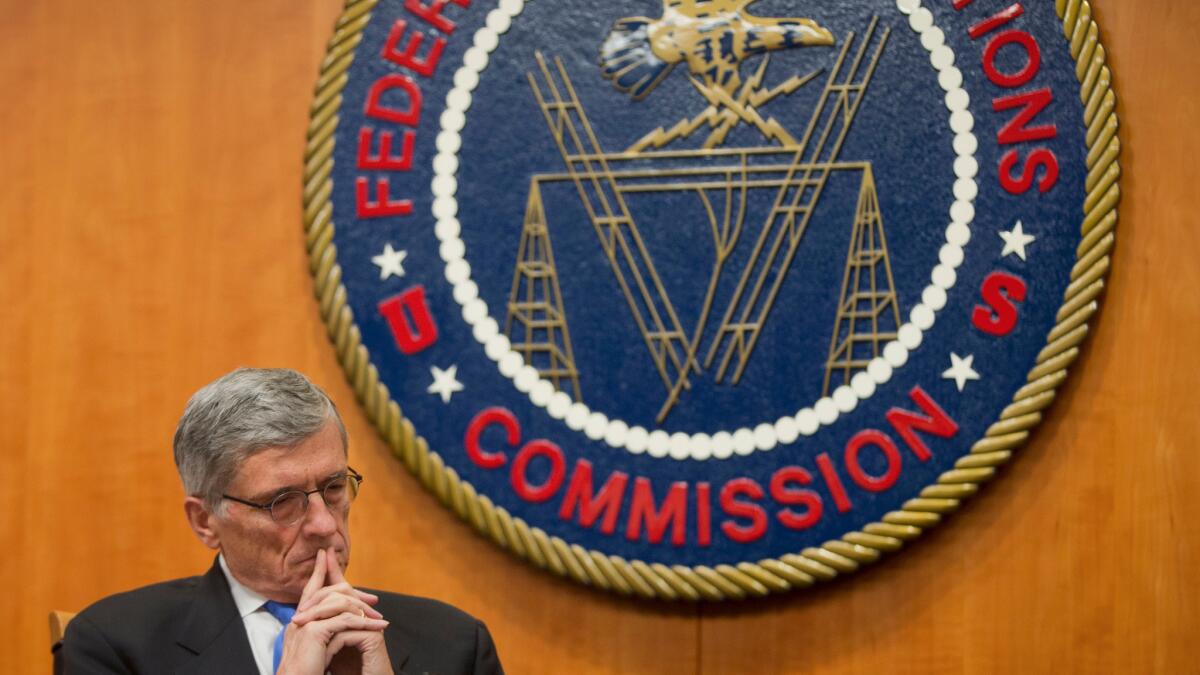Opinion: FCC’s net neutrality rules upheld, for now at least

Federal Communications Commission (FCC) Chairman Tom Wheeler listens to commissioners speak prior to a vote on Net Neutrality in February 2015.
The Federal Communications Commission’s tough new rules barring broadband Internet providers from meddling with their customers’ Web browsing survived a first court test Tuesday, thanks largely to a 2005 Supreme Court ruling that upheld the FCC’s move to deregulate broadband.
It’s not quite as ironic as it seems. In the 2005 ruling, a divided Supreme Court held that the FCC had the authority to classify cable TV operators’ broadband Internet service, known as cable modem, as an “information service” subject to light regulation, not a “telecommunications service” that could be strictly regulated. (Telecommunications services essentially open lines of communications between users and the destinations of their choice, while information services interact with users over those lines of communications.)
At the time, some dissenting justices felt that broadband clearly met the statutory definition of a telecommunications service. But the court’s majority held that Congress left the distinction between the two types of service ambiguous, granting the FCC the authority to make the call based on the statutory parameters. And as it made that judgment, the court ruled, the FCC could consider users’ perception of the services being offered.
That final point weighed heavily with the three-judge panel at the D.C. Circuit Court of Appeals, which heard the lawsuit that an array of Internet service providers and interest groups had filed against the FCC’s new rules. The plaintiffs argued that the rules, which reclassified broadband as a telecommunications service and banned ISPs from interfering with the data exchanged among users, websites and online services, violated the 2005 Supreme Court ruling and federal law.
On Tuesday the panel split, 2-1, over whether the FCC followed the proper procedures in adopting its rules (the majority said yes, the dissenter said no). But all three judges agreed that the commission had the authority to reclassify broadband.
As the majority observed, the FCC made a good technical argument that broadband should be classified as a telecommunications service, although obviously the opposite case could be made. But on the public perception front, the evidence before the FCC was overwhelming. Consumers see broadband simply as a way to connect to the sites and services they choose, and to deliver the data they select to the destinations they pick. That’s quite different from the late 1990s, when broadband made its debut. Back then, the market for Internet access was dominated by America Online’s dial-up service, whose main feature was a “walled garden” of online content that it curated. AOL was a true information service, relying on other companies’ phone lines to provide the connection that AOL used to deliver its interactive content.
Today, broadband is marketed less like an AOL-style mall and more like the open road. In fact, the court noted, broadband ISPs compete for customers by bragging about their speed and reliability, not the content and services they throw in. That reflects the reality of how people shop for broadband, assuming they have a choice of provider – they don’t make their decision based on how great an ISP’s email service is, how compelling its home page might be or how well it blocks viruses, they’re just looking for a reliable and affordable connection to Netflix, Facebook and the many other third-party sites and services they use.
The case is sure to be appealed, so the FCC’s net neutrality rules will have more tests to pass. And Congress may yet intervene, amending the Communications Act to clarify what the commission’s authority over the Internet should be. In addition, there are important questions yet to be answered about ISPs’ ability to offer seemingly pro-consumer, pro-competitive services that aren’t strictly neutral, such as T-Mobile’s move to provide some types of video without data charges.
But for now, at least, the FCC’s net neutrality rules will remain in place. Having seen the D.C. Circuit reject two of its previous attempts to preserve neutrality on the Internet’s last mile, the commission is now batting one for three.
Follow the Opinion section on Twitter @latimesopinionand Facebook
More to Read
A cure for the common opinion
Get thought-provoking perspectives with our weekly newsletter.
You may occasionally receive promotional content from the Los Angeles Times.











